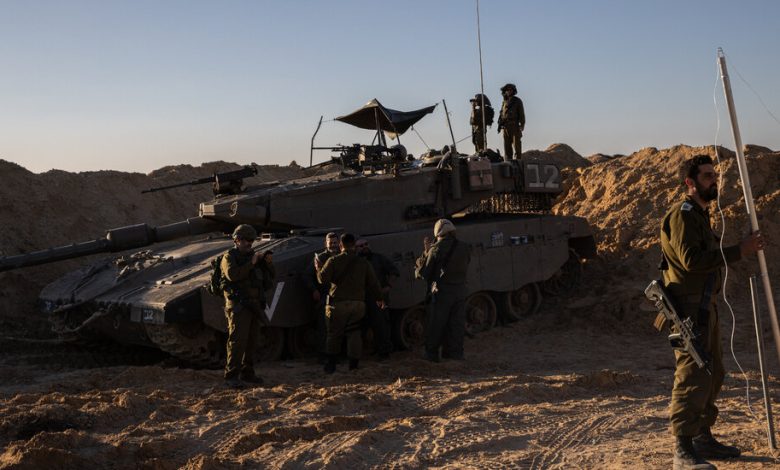Israelis Question Army’s Rules of Engagement After Hostages Slain

The news that three Israeli hostages were mistakenly shot and killed last month in Gaza by soldiers meant to save them outraged many in Israel, who have since demanded answers about how the army conducts itself on the battlefield and safeguards civilians.
The three male hostages, captured by Hamas terrorists near the Gaza border on Oct. 7, were killed in Gaza City on Dec. 15. The men, aged 24, 26, and 28, were unarmed when they were shot. They had removed their shirts to reveal that their bodies were not strapped with explosives, and they were waving a makeshift white flag.
A military investigation is underway, but immediately after the shootings, officials said the army’s rules of engagement had been violated.
“The shooting of the hostages was carried out contrary to the open-fire regulations,” said Lt. Gen. Herzl Halevi, the Israeli military’s chief of staff. “Shooting at someone who raises a white flag and is seeking to surrender is absolutely prohibited.”
The killings shocked Israelis, for whom the military is a revered national institution in which service for most adult citizens is compulsory. Israelis are taught as early as grade school about the “purity of arms” doctrine preached by the Israel Defense Forces — the idea that soldiers must never use their weapons or power to harm noncombatants. Every Israeli soldier carries in his or her pocket a printed copy of “Spirit of the I.D.F.,” guidelines that lay out the military’s values, said Nir Dinar, an army spokesman.
While the deaths of the hostages brought questions about the military’s rules of engagement home to Israelis, human rights groups and the United Nations have said the military’s failures to properly enforce those rules most often apply to troops’ frequent interactions with Palestinians.
The details of the rules of engagement — the conditions under which soldiers are permitted to open fire — are classified because publicizing them would enable enemy forces to take advantage of them, said Mr. Dinar, adding that they were consistent with international law.
Maj. Gen. Yehuda Fuchs, the head of the military’s Central Command, specified in a letter to soldiers last year that in order to open fire, troops must believe there is a “clear and immediate danger.” Under the rules, he wrote, soldiers should discharge their weapons only in a “life-threatening situation.”
The U.N. body that monitors the human rights of Palestinians called on Israel on Dec. 20 to investigate accusations that soldiers had “summarily killed” at least 11 unarmed Palestinian men in Gaza City a day earlier. The Israeli military categorically denied the accusation. Soldiers, the military said, had encountered armed militants in the building, clashed with them and killed some. For some members of the Israeli public, the hostage deaths were the latest eye-opening incident to highlight the gap between the army’s rules and the reality of war.
In November, an off-duty soldier killed an Israeli lawyer who had chased two Palestinian gunmen that had fired into a crowd of people waiting for a bus in Jerusalem. The soldier said he mistook the lawyer, Yuval Castleman, 37, for one of the assailants. But in a video of the incident, Mr. Castleman is seen dropping to his knees, throwing down his weapon, raising his hands in the air, saying he was Israeli and pleading with the soldier, “Don’t shoot.”
Three people at the bus stop were killed in the attack before Mr. Castleman intervened, and five were injured. The soldier was placed briefly under house arrest after a public uproar, and then his passport and right to carry a weapon were taken away.
And on Wednesday, the Israeli military said that Sahar Baruch, 25, who was taken hostage on Oct. 7, was killed last month during a rescue attempt. The military said it was not yet possible to determine whether he was killed by Hamas or by fire from its own forces.
Well before the war in Gaza, human rights groups had for years accused the army of failing to enforce its rules of engagement in the occupied West Bank and not punishing those who violated them.
According to a 2022 report by the Israeli human rights group Yesh Din, which was based on data provided by the army for the years 2017 to 2021, about 20 percent of 1,260 complaints by Palestinians about alleged offenses committed by Israeli soldiers against them or their property were investigated, and less than 1 percent resulted in a criminal indictment.
Dror Sadot, a spokeswoman for B’Tselem, another Israeli human rights organization, said the problem did not lie in the military’s rules, but in the government’s policies.
“The policy is one of excessive use of force when we’re talking about Palestinians, shooting even if there is no risk to the soldiers,” Ms. Sadot said. With the exception of a few high-profile cases that draw the news media’s attention, she said, “soldiers act with impunity.”
More broadly, she said, “We know that Israel policy in Gaza right now doesn’t differentiate between civilians and combatants — we’re seeing this with the carpet bombing from the air.”
The Israeli military recently issued an apology about a Dec. 24 airstrike in which dozens of civilians were reportedly killed when jets struck buildings next to those where Hamas operatives were located. “The I.D.F. regrets the harm to uninvolved individuals and is working to draw lessons from the incident,” the military said in a statement.
And last month, when the killing of the three hostages was reported, several commentators noted that the shootings might never have come to light had the victims not been Israeli.
Avi Shamriz, the father of the slain hostage Alon Shamriz, 26, has accused the army of murder and lawlessness.
Alon Shamriz had served in the army and knew the rules of engagement, his father said. His son, the elder Mr. Shamriz said, had probably instructed the other men on what to do — remove their clothing and hold a white flag — but they were shot nonetheless.
“They cried out for help. They did everything right,” Mr. Shamriz said on Israel’s Channel 13. “It wasn’t neglect, it was lawlessness. Someone took the rules of engagement into his own hands and killed my son.”
The message from the mother of another of the killed hostages, however, struck a very different tone.
Iris Haim, the mother of Yotam Haim, 28, said she understood that the soldiers were operating in Gaza under extremely difficult circumstances and did not have the luxury of second-guessing.
In a recorded message to the unit, in which the soldier who killed her son had served, Ms. Haim told the troops that she loved them and embraced them from afar. She was sad, she said, but not angry, and she did not pass judgment on them. She urged the troops not to “hesitate for a second if you see a terrorist. Don’t think that you killed a hostage deliberately. You must look after yourselves because only that way can you look after us.”
Mr. Dinar, the military spokesman, said the hostages’ deaths were the result of a snap judgment made in the fog of war and not because the rules of engagement were flawed. There are currently no plans to modify or alter the rules in any way, he said, though they are being reviewed carefully, re-emphasized and “sharpened.”
“This was an extremely tragic mistake, and a painful failure,” Mr. Dinar said. “We do not shoot people who have their hands up.”
The troops, he said, are operating in crowded urban areas where they are fighting Hamas gunmen, who may wear civilian clothes rather than uniforms that clearly identify them as soldiers.
The killings, he added, took place in Shejaiye, a neighborhood in Gaza City that is a Hamas stronghold, and where Israeli troops did not expect to encounter civilians because most had left northern Gaza on the orders of the military. Just days before the hostages were shot, two senior Israeli commanders and seven other soldiers were killed in a Hamas ambush in the neighborhood.
Hamas gunmen have lured Israeli soldiers into ambushes by wearing Israeli military uniforms, or playing recordings of a baby crying, said Asher Halperin, a lawyer who has defended soldiers accused of violating the military’s rules of engagement.
Although the same rules apply to soldiers in peacetime as they do in war, he said, kinetic battles like those taking places in Gaza make applying the rules much more complicated.
“This happened where there was very difficult fighting, and you have to make decisions in a matter of seconds, and these are hard decisions,” Mr. Halperin said.





